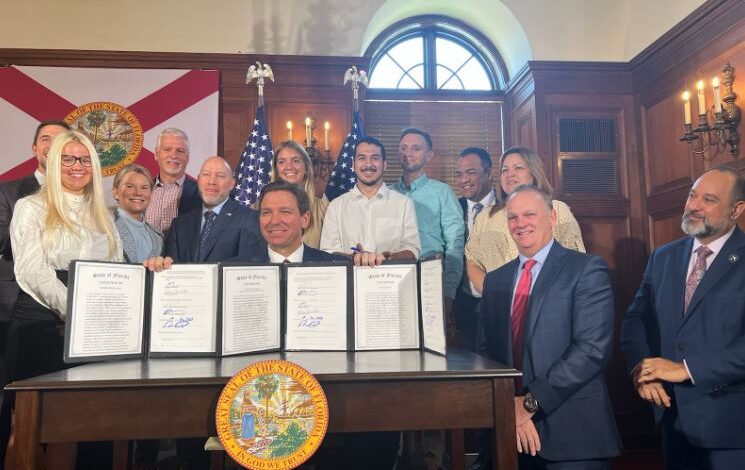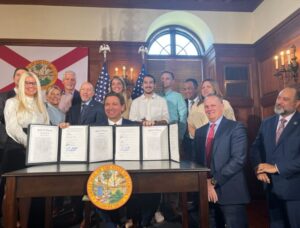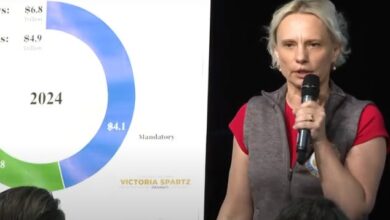Ron DeSantis signs three more impactful bills including one that prohibits DEI programs in state colleges and universities


Florida Governor Ron DeSantis made a significant move today by signing three bills into law, including Senate Bill (SB) 266, which prohibits state colleges and universities from utilizing state or federal funds for Diversity, Equity, and Inclusion (DEI) programs.
Representative Alex Andrade, co-sponsor of the bill and a member of the Florida House District 2, expressed his satisfaction, saying, “With his signature today, Governor DeSantis just solidified the dismantling of DEI bureaucracies on FL college campuses. This is one of the most significant higher education reforms in half a century, and I couldn’t be prouder to play a part in this achievement.”
Speaking at the New College of Florida in Sarasota, Governor DeSantis highlighted the state’s seven-year streak as the top-ranked state in higher education. He asserted that by signing this legislation, Florida ensures that its institutions prioritize diversity of thought, civil discourse, and the pursuit of truth for future generations.
Mariya Calkins, founder of Moms For Liberty’s Santa Rosa County Chapter, expressed support for the bill, stating, “This is another step to get rid of indoctrination in public education. Teachers get indoctrinated at colleges where education should be about education, not indoctrination.”
Senate Bill 266 aims to prevent the infiltration of “woke” ideologies in state universities and colleges. It prohibits the use of public funds for initiatives promoting potentially divisive political and social activism, such as DEI programs. The bill also prohibits programs, majors, minors, curriculum, and general education core courses that violate Florida law by promoting prohibited discrimination or relying on theories that claim systemic racism, sexism, oppression, and privilege are inherent in U.S. institutions to maintain social, political, and economic inequities. Additionally, the bill imposes a renewed sense of ownership and accountability on university presidents regarding faculty hiring, promotion, and, if necessary, disciplinary actions.
The legislation also enhances higher education opportunities at Florida’s major universities by establishing or expanding specialized colleges within these institutions. Notable provisions include the establishment of the Hamilton Center for Classical and Civic Education as a college within the University of Florida, renaming and redefining the goals of the Florida Institute of Politics at Florida State University (now the Florida Institute for Governance and Civics), granting additional authorities to the Adam Smith Center for the Study of Economic Freedom, and creating the Institute of Risk Management and Insurance Education at the University of Central Florida.
Governor DeSantis also signed House Bill (HB) 931, which prohibits public institutions in Florida from subjecting students, faculty, or staff to political loyalty tests. Additionally, he signed SB 240, known as the Reimagining Education And Career Help (REACH) 2.0 Act, which expands workforce education programs and improves access to career and technical education (CTE) programs.
HB 931 effectively ends the practice of requiring political statements and ideological attestations from faculty and students during hiring, promotion, and admissions processes. It further mandates that state universities establish an Office of Public Policy Events, facilitating the hosting of events and speakers representing diverse opinions on public policy issues.
SB 240 builds upon the 2021 REACH Act, aimed at aligning Florida’s workforce education investments and meeting workforce demands with well-trained talent. The new legislation expands workforce education programs and improves access to career and technical education from middle school through technical colleges, state colleges, and local CareerSource offices. SB 240 enables the creation of apprenticeship and pre-apprenticeship programs across the state, authorizes state universities to develop work and learn programs that allow students to graduate with minimal student loan debt, and expands the internship tax credit program to encompass businesses employing student apprentices and pre-apprentices.
At the middle and high school level,
SB 240 mandates that school districts ensure every high school student has access to at least one work-based learning opportunity. It also requires each high school to host a career fair during the academic year, and it allows middle school students interested in continuing their CTE education to attend a high school offering such programs, regardless of their zip code.
Governor DeSantis also expressed his support for budget items included in the General Appropriations Act (GAA) for 2023. These strategic investments aim to enhance the educational excellence of Florida’s 12 state universities and 28 state colleges. Noteworthy provisions in the GAA include $100 million for the State University System Performance-Based Recruitment and Retention Incentive, $645 million for State University System Performance-Based Incentives (an $85 million increase from the previous year), and a $100 million base funding increase for State Colleges to further align them with high-demand workforce pathways. Additionally, increased funding of $50 million for New College is intended to provide scholarships, faculty expansion, and substantial campus improvements, reinforcing New College’s status as Florida’s state honors college.
Governor DeSantis expressed his satisfaction with these important legislative accomplishments, stating, “Florida is taking a stand for empowering students, parents, and educators to focus on creating opportunities for our younger generations. I am happy to have worked with the legislature to get this important legislation signed, sealed, and delivered.”




